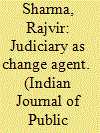| Srl | Item |
| 1 |
ID:
124507


|
|
|
|
|
| Publication |
2012.
|
| Summary/Abstract |
The Indian Judiciary has completed 60 years of its existence and has made long lasting contribution to the system of governance that has impacted the life of the people and the nation. In many ways, it has impacted the nature, scope and processes of public governance and can claim credit for expanding the meaning of the constitution in favor of different segments, especially the poor, of the society. It has strengthened Indian federation, catalyzed goal achievement, deepened democracy and defended people against excesses of the State. It has acted as a promoter of peace, cordiality and balance and coordination between different organs of the government. At one time it was thought that the role of judiciary is only to interpret the laws and the regulations and provide judgements exclusively from the legal point of view. This perspective has undergone a sea change in the recent times. Envisaging the role of the supreme court of India, the first Chief Justice of India, Justice Kania said:
"The Supreme Court would declare and interpret the law of the land, and with the tradition of Indian judiciary, it would work in no spirit of formal or barren legalism, within the limits prescribed by the constitution. The court, as part of the federal system and as the defender of democracy, is responsive to the changes in Indian society
|
|
|
|
|
|
|
|
|
|
|
|
|
|
|
|
| 2 |
ID:
114761


|
|
|
|
|
| Publication |
2012.
|
| Summary/Abstract |
It may not be possible to define Rule of Law with scientific precision but it cannot be dismissed as an elusive notion or as an unruly horse. Rule of Law is the heritage of all mankind because its underlying rationale is belief in the human rights and human dignity of all individuals everywhere in the world. It needs to be emphasised that there is nothing western or eastern or northern or southern about the concept of Rule of Law. It has a global reach and dimension. Rule of Law symbolises the quest of civilised democratic societies, be they eastern or western, to combine that degree of liberty without which law is tyranny with that degree of law without which liberty becomes licence. It is entrenched in India to the extent that the Rule of Law cannot be abolished even by a constitutional amendment.
|
|
|
|
|
|
|
|
|
|
|
|
|
|
|
|
| 3 |
ID:
168809


|
|
|
|
|
| Summary/Abstract |
The dominant paradigm in scholarship on death penalty law in India is doctrinal and empirical. There is an equally indispensable need for a third approach that focuses on the rhetoric of and in death penalty judgements. In the first part of the paper I argue why such an approach is necessary, and in the second part I instantiate this by a close reading of narrative techniques and rhetorical devices deployed in two recent Supreme Court judgements. I show the use of antirrhetic speech, ekphrasis and the ‘reality effect’ woven into the narrative of the taboo on incest, peopled with characters such as ‘diabolical monsters’ plotting ‘sinister designs’. Embedded in these narratives are judges who see themselves as reconstituting a community on the verge of breakdown. In this circular operation, monsters are linguistically created, and the monstrosity of the criminal is then used as a justification for death. Yet such a monster cannot be a wholly non-human figure because intent is necessary for fixing legal responsibility.
|
|
|
|
|
|
|
|
|
|
|
|
|
|
|
|